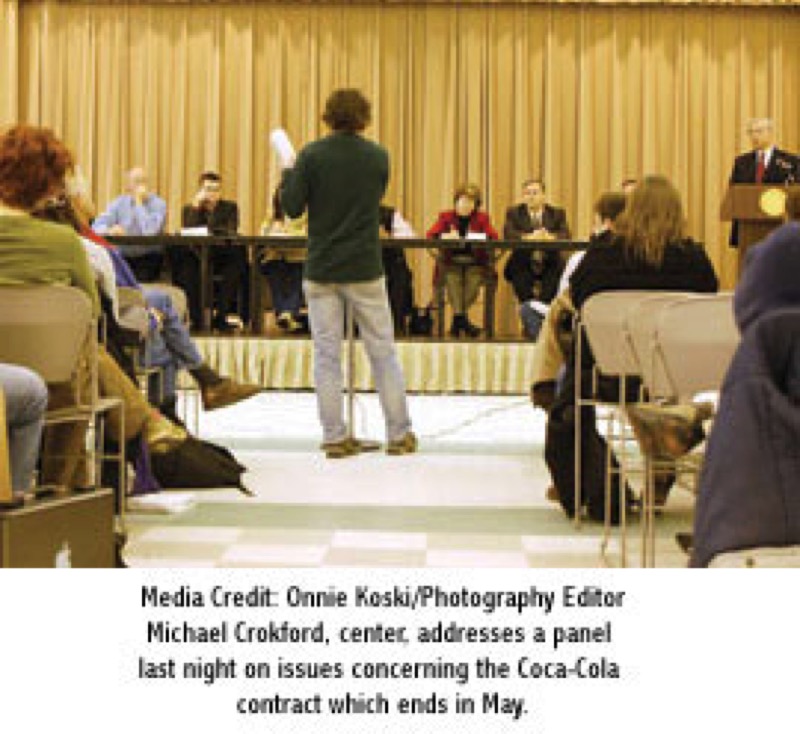Students question Coke
By Mike New | The Daily Targum (Rutgers University) | 2/25/05
Read Original
Ultimately, the decision will be made by the highest members of the University administration and won't be made for a few months. But yesterday afternoon in the Douglass College Center, students and faculty had their first chance to give their input on a controversial decision - the one regarding the upcoming beverage contract signing.
The University held a public hearing yesterday as a forum for students to voice their opinion on the new beverage contract.
For the past 10 years, the University has been in an exclusive contract with Coca-Cola Company, meaning that all beverages distributed in dining halls or sold on campus are Coca-Cola products. However, now that a 10-month extension on the contract is nearly up, the University is preparing for either a switch - or more of the same.
Normally, the only controversy would be one of taste, but in light of serious human-rights allegations against Coke, many groups have come out in opposition of renewing the current contract. Some have even come out against Coke and its main competition, Pepsi, over issues of corporatization. Those voices, among others, were heard at the hearing.
With Coca-Cola allegedly involved in the murder and torture of bottle workers in Columbia who tried to unionize, many brought up moral concerns to the committee.

Michael Crockford, the head of RU Sustainable and a graduate student, had two positions.
"We shouldn't sign with Coke for what they've already done and what they failed to do," Crockford said. "[Secondly,] the University could adopt some formal method by which to review formal contracts."
Amy Bahruth, a faculty member of the Labor Education Program, strongly hopes the contract will not be renewed.
"That would send the biggest message - [that] people will not tolerate human rights violations in the pursuit of profits," Bahruth said. "The University should not reduce its integrity by selling its ethics to the highest bidder."
Kristen Gilmore, president of the Graduate Student Association, only spoke briefly on a trip she took to Mexico in January.
"I was in a Third World country a month ago and saw the effect corporations have on a people and their communities," Gilmore said. "The people are what always resonates in my mind."
She summed up her thoughts with one line.
"The bottom line is that people are dying," Gilmore said.
One of the few students in attendance who supported a big-money contract with Coke or Pepsi was Josh Ontell, who is the president of the Rutgers College Class of 2008.
"I don't want anyone to suffer," Ontell said. "But there are people who are scraping by. We are responsible for giving an affordable education. We really need every single penny." [Josh Ontell recently contacted us (5/16/09) and wrote: "When I spoke at the forum, I only said that the University administration should take into account the difficult financial situation of the school when considering the Coke contract. I did not come out in support of the Coke contract."]
Chris Bylone, a Cook College fifth-year student, had a different view of the problem. He believes that the University also has a responsibility to help local farmers.
"The University is the land-grant institution of New Jersey," Bylone said. "We're supposed to protect and preserve agriculture."
Bylone said there are many programs at the Food Innovations Center to help local farmers. Through the University, students have been working with one state farmer to create and develop peach ice tea. However, the exclusivity of the current beverage contract creates a problem for Bylone.
"Right now, I don't see how it could be sold," Bylone said.
However, Bylone also believes the issue will be addressed when the time to make a new deal comes.
"There's a very good chance," Bylone said on whether such language would be left out of the new contract. "There's many vocal people, and the University is listening, really for the first time.
After the meeting concluded, Rutgers College junior Vincent Trivett, the president of Culture Jam, wondered how the University could possibly sign a contract with Coke.
"If I were one of [the committee members,] and I had heard what was said today, there would be no amount of money to tempt me - no amount of difficulty and labor to discourage me to do anything but say no," Trivett said.
Gregory Blimling, the vice president for Student Affairs, ran the hearing and was very pleased with the results.
"I thought it was very useful," Blimling said. "We're now well informed. We appreciated the time spent doing research."
Crockford thought the turnout - roughly 45 people - spoke for itself.
"Four [o'clock] is the busiest time of day," Crockford said. "Even with the snow, we still had a lot of people."
Bahruth also appreciated the opportunity to come to a public forum, she was also cautious.
"I hope they're not just paying lip service to us," Bahruth said.
FAIR USE NOTICE. This document contains copyrighted material whose use has not been specifically authorized by the copyright owner. The Campaign to Stop Killer Coke is making this article available in our efforts to advance the understanding of corporate accountability, human rights, labor rights, social and environmental justice issues. We believe that this constitutes a 'fair use' of the copyrighted material as provided for in section 107 of the U.S. Copyright Law. If you wish to use this copyrighted material for purposes of your own that go beyond 'fair use,' you must obtain permission from the copyright owner.











